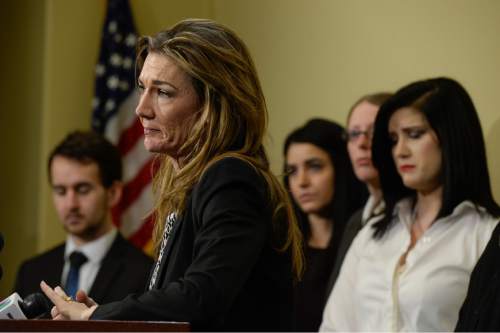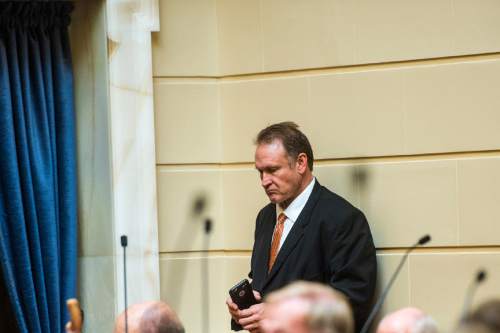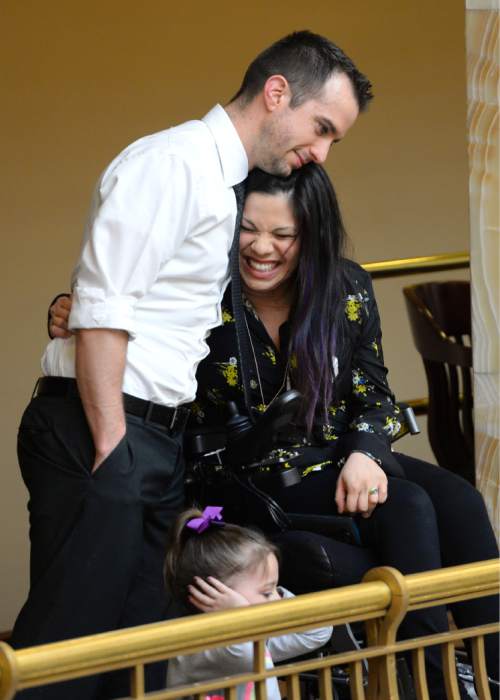This is an archived article that was published on sltrib.com in 2016, and information in the article may be outdated. It is provided only for personal research purposes and may not be reprinted.
After weeks of wrangling, a bill that was to have legalized medical marijuana in Utah was headed for a vote — and likely passage — Thursday when it got stopped dead as legislative leaders realized there was no money to implement it.
The demise of the measure — narrower than a more sweeping proposal that also fizzled — means proponents of medical marijuana will file papers April 16 and begin working to put an initiative on the ballot to create a wider medical cannabis program.
"One way or another, patients are going to get the help they need," said Christine Stenquist, president and co-founder of the group TRUCE, which stands for Together for Responsible Use and Cannabis Education.
The initiative will have to be targeted for the 2018 ballot, because there is not enough time and too many hurdles for proponents to get the measure to a vote this year.
Rep. Brad Daw said he had a green light from House leadership to bring SB89 — rewritten five times in the past few weeks — up for a vote. A version already had cleared the Senate.
"I had, not a huge margin," the Orem Republican said, "but a comfortable margin to pass the bill."
But before it made it to the floor, leaders realized the measure would have required the state to spend $800,000 for agencies to begin licensing and regulating the greenhouse operations, processing facilities and dispensaries to make the program operational.
By the session's last night, all of the money had been spent. The bill died without debate or a House vote.
The measure created deep rifts between SB89's sponsors — Daw and Sen. Evan Vickers, R-Cedar City — on one side and patient advocates and Sen. Mark Madsen, R-Saratoga Springs, the sponsor of SB73, a more ambitious proposal, on the other.
"It [SB89] needed to die," said Stenquist, who called the Vickers-Daw bill deeply flawed. "It's better that we slow down and take the time … and work on educating each other a little better. If it means taking another year and working on it legislatively, we should. But in the same breath, the ballot initiative has to go forward."
Daw said he didn't understand the opposition to his legislation from the patient community.
"It would be difficult to argue this bill didn't help people. OK, maybe not the way you wanted them helped, but if this bill passed, you could go to a doctor, get a cannabis card and get your medicine," he said. "I am deeply puzzled by, on one hand, saying they want to help people, but on the other hand killing a bill because it doesn't help them the way they want to be helped."
For Madsen, who sparked the medical-marijuana issue in Utah when he introduced a legalization bill in the 2015 session, it was a bitter defeat in his final year on Capitol Hill. He felt like House leaders plotted to kill his measure, which passed the Senate, and called the actions "disgusting."
The Church of Jesus Christ of Latter-day Saints also issued multiple statements opposing his bill.
Madsen came to the issue with personal background, having nearly died from an accidental overdose on opiates and having tried medical marijuana for back pain while in Colorado.
After the House committee defeated his bill, Madsen told reporters he would move to South America when his term in the Legislature ends — something he had planned before the bill was voted down.
"I desire more freedom in my individual life," he said, "than I'm allowed to have in this state."
Twitter: @RobertGehrke







